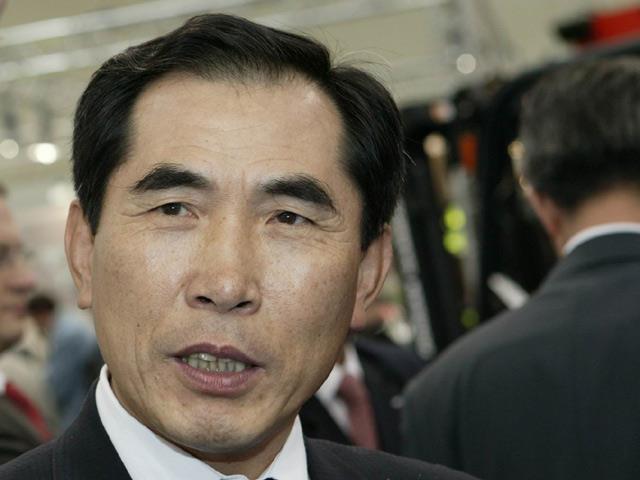 DJ Ra at Doosan Infracore's stand in CeMAT 2005. |
Duck Joo Ra, executive managing director of Doosan Infracore Co Ltd, headquartered at Incheon, South Korea, is an affable man with an unassuming manner. The Forkliftaction.com team was privileged to meet him at a dinner during CeMAT 2005 in Hannover.Ra joined Daewoo Forklifts (now known as Doosan Infracore) in 1973 after graduating from Seoul National University with a mechanical engineering degree.
"I started my career at the R&D centre, developing industrial robots, laser-machining tools and remote-controlled helicopters. In 1990, I moved to the aerospace division and developed basic trainer aircraft for the Korean air force," Ra said.
Ten years later, Ra joined the industrial vehicle division and was soon overseeing manufacturing and marketing of Doosan-Daewoo forklifts.
"I particularly enjoy meeting new people, especially our invaluable customers. As we are growing our business into one of the world's top forklift suppliers, it is my job to make our brand strong and competitive at a world-class level.
"Thankfully, I have a lot of good people helping me," Ra said.
At the CeMAT dinner, the Forkliftaction.com News team had the chance to mingle with Ra's subordinates. A UK-based staff member said he had once been invited to dinner with Ra and his family. "Ra is a very humble man. I remember him treating me as if I were part of his family and this is very rare for a man high up there," the Doosan Infracore employee said.
Ra told Forkliftaction.com News that although he had worked on many interesting projects, it was the people he worked with who brought him the most joy.
"When you reach a higher level in business, the most satisfaction comes from seeing people work together to meet our business objectives. We have a good team working together."
He said the materials handling industry was now more competitive than it had ever been. "Even though there has been some consolidation in the market, no one can take their share of the market for granted. Product design is changing as a result, but changes in the market's requirements are less dramatic."
"It used to be that the mechanics of the machine were most important. Now new technology has become much more integral to the design of forklifts, but I'm not totally convinced it is all customer-led," he said.
"Some changes clearly are. Like environmental pressures that have led to the increasing demand for electric models, which in turn has led to higher specifications and higher expectations of performance.
"At the same time there's now much more focus on total life cycle costs, particularly with fleet users who want to keep them as low as possible," Ra said. "We've always felt this was a particular strength of ours, perhaps because of our experience with defence and construction equipment."